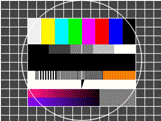Jan Reetze
MEDIENWELTEN
Schein und Wirklichkeit in Bild und Ton
WORLDS OF MEDIA
Appearence and Reality in Sound and Picture
Springer Nature
Berlin, Heidelberg, New York 1993
ISBN 3-540-56538-8
available (also as e-book) from Springer or Amazon
(Book in German language!)

Back jacket
No matter whether we’re watching TV, listen to the radio, making telephone calls, reading the newspaper, watching movies in the theater: We’re dealing with the same technology – computer technology.
In this book, Jan Reetze guides us through the history of media techniques from silent movie to music video, from cinema orchestra to electronic sound recording. He shows how the entry of the computer into film, TV and music not only leads to new aesthetical qualities but also merges reality and illusion.
On this book
Today by using computers, pictures and sounds can be produced, stored, edited and changed. Once cinema, TV and music were different media, but now they are going to be one single multi-medium. Meanwhile there are some realities existing exclusively in electronic media. And the viewer doesn’t need to get anything right to feel well-informed.
Jan Reetze traces the main stages of media development:
- the ways of the music, from early experiments of visualization, the first synthesizers, up to computer-driven radio programs,
- the ways of the movie, from the first silents to animation and sound movies, up to today’s video technology, to computer animation and music videos,
- the entry of the computer technology into the electronic mass media and their importance as an economic factor.
Content
Sound Colours and Colours of Tone: Early visual Music
Agitation and Insanity: The Movie
- Early movies
- Tinting and toning
- Colour film
- Cinema music
- Movie narrators, title cards, inserts
- Sound movie systems
- Editing
- Subjective lenses
- Animation and special effects
The electronic paintbox: Video, audio-visual Art and Computers
- Magnetic recording and video
- TV + video = Video art?
- Video, micro electronic and computer
- Chroma Key (Bluescreen)
- Paintbox and Harry
- Digital video effects
- Computer animation
- Post production
- Video, computer and movies
Sounds made from Electricity: Synthesizers and other electronic Musical Instruments
- Early electro-acoustical starts
- “The Gentlemen at Cologne”
- Synthesizers
- Drums out of the can: Synthesizer peripherals
- Storage and programming
- New methods of sound synthesis based on computer simulation
- Sound sampling, drum computers, effects
- Re-synthesis
- MIDI and SMPTE
- Workstations
- Digital sound recording
Musical Industrial Architecture: Trends in serious and Pop Music
- “Dreiklangsdimensionen”: Electronic rock music
- Pop and applied musicians and their working reality
Worlds of Chips: Computer and Media
- The Artificial Intelligence problem
- Neuro computers and Fuzzy Logic
- Computer simulations
- Making speeches without being there
- Hi, this is the cashbox speaking: Interactive video
- Following Alice into the virtual wonderland
- Here’s composing for you: workmate computer
Music Videos: Production, commercial Relevance, Viewers
- Starting Shot: MTV
- The making and the costs
- Economic pressure and the contents of music videos
- Arts and innovation: Music videos as playground
- Music videos and musicians
- Music videos, market and media
Flicker and Hiss: The Media Systems
- TV as a product
- Image design on all channels
- Rede Globo (Brazil): “This program’s doing the trick!”
- And what’s doing the trick in Europe?
- The story of the “ARD-Eins” (logo of the ARD)
- MTV Europe: Eye powder with stereo sound
- Computer design as an economic factor
- The siding station of ideas: Arts and medium economy
… and don’t forget to ground your Antenna: The good old Radio
- Time check between jingle and blue music: Computers doing formatted radio
- Radiomax
The Media Synthesis
Reviews
Reetze describes the technical and aesthetical trends … On the one hand he delivers an interesting history of culture and technology, on the other hand he shows the changing of the society from information to illusion society.
(Forum Lesen)
By no means does the author describe only the more or less likely scenarios in which we believe today will be able to describe our dealing with the media in the near future. He’s doing something I consider much more exciting: He gives such a fair amount of knowledge on the history of media to the reader so that the reader is able to come up with such visions for himself.
(Hessischer Rundfunk/Radio Frankfurt)
Even though Reetze’s arguments are often pragmatic, he probably will leave his impressions with the reader: One could become more aware of one’s own media consumption.
(Rhein-Neckar-Zeitung, Heidelberg)
Written very informative, very vivid, very conscientious.
(Das gute Buch in der Schule/The good book at school)
Many examples demonstrate the intensive mixing of arts and technology, showing that especially the experiments and initiatives of artists play a decisive role in advancing the technical development of media.
(DAAD-Letter)
Good to see that the author never succumbs to the danger of mythologizing the new technologies, and he shows the relations between technologies and profit in a refreshingly unemotional way.
(Positionen)
This book will surely hold its topicality beyond the mid-nineties – which means a lot. … It can’t be underlined too much that here finally someone knows what he is talking about.
(Medienwissenschaft)
